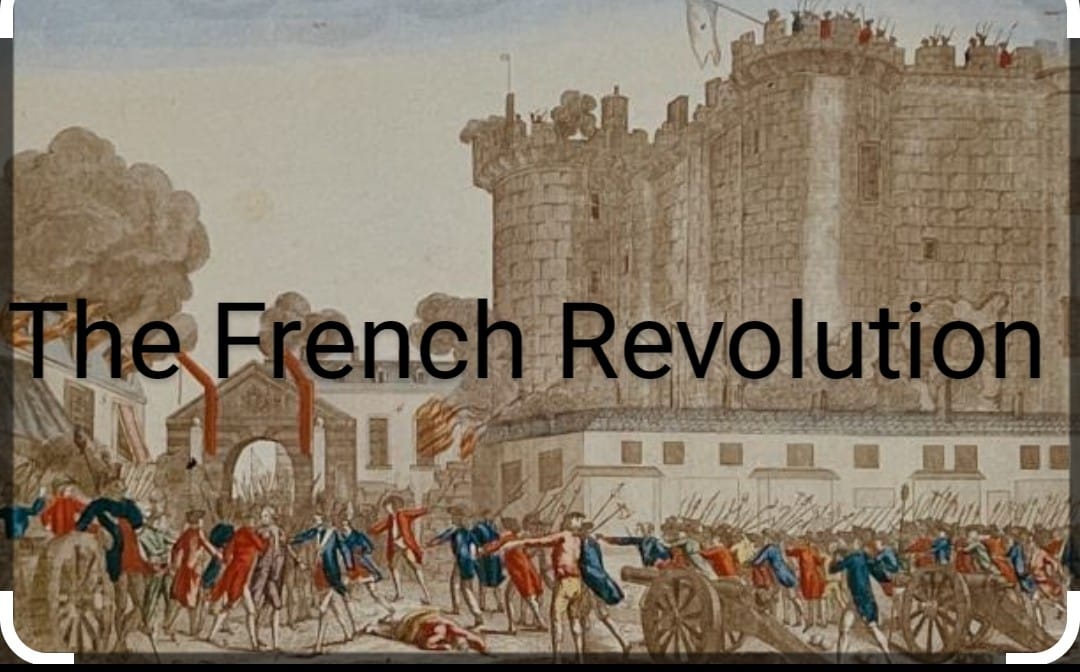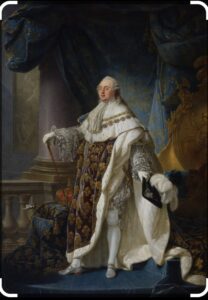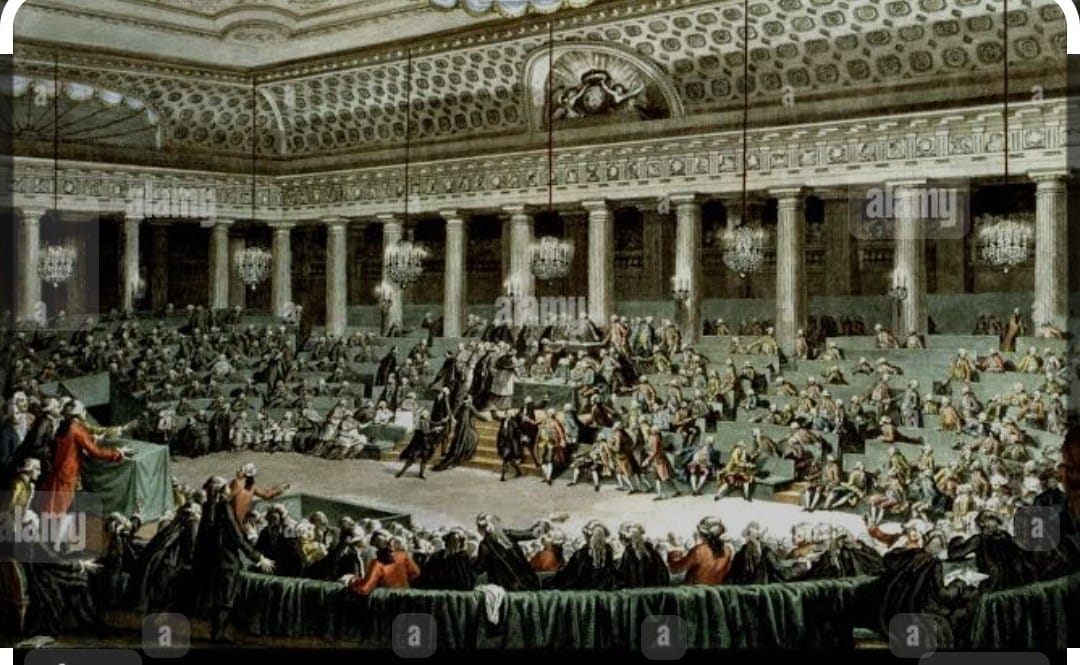The French Revolution
The French Revolution is important Chapter of History with basic information of the Revolution covers the syllabus of Class 9th.
The French revolution :

The French society was divided in three estates during the 18 century they First , Second and Third estate .
SOCIAL HIERARCHY : As the society was divided in three estates first estate consist of CLERGY who were very less in number second estate consist of Nobility they were also but maximum population was of third estate which comprises of Big businessman , merchants, court officials , lawyers , Peasants ,artesian landless labor and servants
French society was divided into three estates First Estate were The clergy (about 1% of the population) Second Estate were The nobility (about 2% of the population) ,Third Estate: Everyone else, including the bourgeoisie, urban workers, and peasants (about 97% of the population)
The first two estates held significant privileges, including tax exemptions, while the Third Estate bore most of the tax burden.
CONDITION OF FRENCH SOCIETY BEFORE The French Revolution
France was ruled by an absolute monarchy, where the king held supreme power. This system had been in place since the Middle Ages, with Louis XIV (the “Sun King”) epitom absolute rule in the late 17th and early 18th centuries’)

Bourbon Kings were leading had very luxury life style so the treasury was getting empty due to their extravagant life style
ii) There were many subsistence crisis
iii) They prolong the war debt and cost of support of American war of independence
iv) Privileges on the basis of birth right
CAUSES OF The French Revolution
a) Social causes that society was divided in three estates clergy, nobles and others. There was birth privileges given in society . The first two estate had to make no economic contribution but all the burden fell upon the third estate people in form of tax The right to representation , separation of churches and state , slavery , closure to western frontiers .
b) Political Causes :
The rulers were very weak and poor and weak policies of Louis XVI the government debts accumulated during the course of two wars , faulty administration and government failures caused the demonstration , strikes and upheavals , the autocracy of king the power of court , burden of taxes
c) Economic Causes :
The treasury of France was nearly empty due to foolish expenditure nature of the Kings , the France was under debt due to long wars and help to America in war of independence was made their treasure empty France was deeply in debt due to its involvement in wars, particularly the Seven Years’ War (1756-1763) and the American Revolutionary War (1775-1783). lastly successive series of poor harvests in the 1780s led to food shortages and inflation this bad harvest added fuel to fire in their economic condition .The tax system was inefficient and unfair, with the poorest paying the most.
The successful American Revolution (1765-1783) inspired many French people and demonstrated that change was possible. It also effected negatively to France’s finances due to its support of the American cause.
King Louis XVI, who came to the throne in 1774, was indecisive and struggled to address himself. His wife, Marie Antoinette, was unpopular and seen as extravagant.
Several finance ministers, including Jacques Necker and Charles Alexandre de Calonne, attempted reforms to address the financial crisis, but these efforts were blocked by the nobility who refused to give up their privilege.
d) Role of Philosophers :
The 18th century saw the spread of Enlightenment philosophy, which emphasized reason, equality, and individual rights. Major philosophers like Voltaire, Rousseau, and Montesquieu criticized the old order and inspired new political ideas. They also played an important role in ignited the mind of the people , they always talked against the birth right and always presented the model of administration based on liberty, equality and fraternity . Rousseau is called father of French Revolution gave the concept of democratic rights came from radical wrote Social contract , Montesquieu wrote the spirito law and the Persian letters Voltaire wrote Candide which highly influenced the mind of the people of France.

e) Immediate causes :
The proposal to increase in tax in 1789 and insistence of Louis XVI on estate wise voting in Estate General were the main cause of uprising among the third estate people of France , Louis XVI called for a meeting of the Estates-General in 1789, the first since 1614. This assembly of representatives from all three estates set the stage for the beginning of the revolution. The Third Estate, frustrated with the voting system in the Estates-General that favored the other two estates, broke away and formed the National Assembly. This act of defiance marked the beginning of the French Revolution.
This background created a perfect storm of economic, social, and political factors that ultimately led to the outbreak of the French Revolution in 1789.
The combination of financial crisis, social inequality, new political ideas, and weak leadership made radical change almost inevitable
EVENTS OF The French Revolution :
IN 1774 LOUIS XVI of the Bourbon family was the king of France during that society was divided into three estates the clergy and the nobility had special birth rights the third estate formed the majority of the population was unprivileged class.
Due to economic instability on 5th May 1789 LOUIS XVI called together the meeting of all the estates in the Estate General to impose the Tax .The members of 3rd estate demanded one person one vote but the King rejected the proposal than uprising started .
On June 20 ,1789 the members of 3rd estate assembled in the hall of indoor tennis court in the ground of Versailles and declared themselves as NATIONAL ASSEMBLY, They demanded to reduce the power of the king.
The King ordered troops to move to in Paris which angered the natives and they completely destroyed the fort of BASTILLE .
ON 14 th July 1789 the uprising crowd stormed to the fort of BASTILLE which was the symbol of tyranny of old regime and destroyed it . This triggered the chain of revolt across the country when the king saw that situation was out of his hands than King LOUIS XVI accorded the recognition to the National Assembly and agreed to give up his power .
On 4th August1789 all the feudal system of obligation and taxes were abolished by decree. Declaration of the Rights of Man and of the Citizen (August 1789) .Women’s March on Versailles (October 1789) Civil Constitution of the Clergy (1790) in Churches properties were confiscated and clergy too had given up all the privileges .
The National Assembly drafted the constitution in 1791 and distributed the powers in legislature , executive and judiciary along with the principle of one person and one vote
Voting was restricted to ACTIVE CITIZEN that is only men, must have age more than 25 of years and pay taxes equal to at least 3 days of labor’s wages Remaining men and all women wee considered the PASSIVE CITIZEN they did not have any political right .
JACOBIN CLUB in The French Revolution :
The Political clubs became a rallying point of discussions on the government policies in the Jacobin clubs which became very popular . The members of Jacobin Clubs mainly belonged to the less prosperous sections of society like small shopkeepers, artisans ,shoemakers, watchmakers, painters as well as servants and daily wages workers Their leader was MAXIMALIAN ROBESPIERRE and they were called sans – culottes meaning breeches without knees .
On 10 th August 1792 Jacobins planned an insurrection and imprisoned the Royal Family On 21 st September the same year declared the France Republic and LOUIS XVI was sentenced to death on the charge of Treasons and was publicly executed on 21 January 1793 .
The Jacobin Leader ROBESPIERE ruled ruthlessly from 1793- 1994 and his regin was known as REGIN OF TERROR in July 1794 he was convicted of excessive and executed on GUILITINE. ( a machine used for cutting the heads of people )
After the fall of Jacobin they allowed the wealthier middle class to seize the power and ruled through an Executives which was made upon Five members called the DIRECTORY from 26th of October 1795 but due to frequent clashes of the directors with legislative council it created political instability .
This gave the way for military dictatorship under NAPOLEAN BONAPARTE who ended the Directory in 1799 and became the first council later on became the ruler of France ” Emperor of France ” 1804 He ruled till 1815 till he lost the battle of Waterloo’
The Legacy of freedom, equality and fraternity that emerged out of the French Revolution remined inspiring ideals of the following world Slavery was finally abolished in 1848 under Napolean from all the colonies of France Women fought for their own rights to vote till 1946
The French Revolution was a pivotal period in French and European history that lasted from 1789 to 1799. It was characterized by radical social and political upheaval, profoundly impacting France and spreading its ideas throughout Europe. Here’s an overview of its key details and effects:
Effects of The French Revolution:
The main Political effects was abolition of the monarchy and establishment of a republic along with the end of feudalism , aristocratic privileges .Separation of church and state took place in the country ,government power was centralize democratic and nationalist ideas across Europe was spread.
Elimination of the old social hierarchy based on estates took place, this Increased social mobility across Europe society became secular .Changes in gender roles and family structures took place
Redistribution of land ,Abolition of internal trade barriers, Rise of Napoleon and subsequent Napoleonic Wars. Encouragement of French as the national language, Art, literature, and philosophy started reflecting revolutionary ideals . New national symbols (e.g., tricolor flag, Marseillaise anthem)
Introduction of civil law through the Napoleonic Code was framed .Establishment of equality before the law .Reforms in the judicial system was made.
Conclusion: The French Revolution
The French Revolution’s impact was far-reaching and long-lasting that are alive in the heart of modern Political ideologies. Its ideals of liberty, equality, and fraternity continue to influence political thought and movements of the present day.
Follow us on: Facebook Instagram
Read More: Russian Revolution